The next day, having made it through the night mostly un-burgled—but for the blood siphoned off by the city’s mosquitos, an occupational hazard of al-fresco dozing—we set off to cover the two days to Masvingo, our next planned rest. On both days, Thijs put down a typically brisk pace, leaving me clinging to his slipstream more often than not. Though, with my vision blurred on the ground behind his back wheel, I had the opportunity to reflect on the forces at play in Zimbabwe. In a society where cash rules everything around you, what happens when it starts to lose its grip? Something else inevitably fills the vacuum. In Zimbabwe, I began to get the feeling that this new ruler was power itself. There were the powerful and the powerless; those who commanded and those who obeyed. From all I’d seen and heard from Edward and Debbie, this power was wielded with all the nonchalance of loose change, without any thought of the consequence on people’s lives. But, as I rode towards Masvingo, I couldn’t have known that I was on the brink of experiencing the plight of Zimbabwe’s powerless firsthand.
The story of my arrest in Zimbabwe began long before they slapped on the handcuffs. In fact, it began in another country entirely.
In a small town called Angonia, a few hours’ ride beyond Mozambique’s border with Malawi, I sat outside a shop, grazing absentmindedly on a carousel of packaged snacks. It had been a long day. Border days often are. By the simple act of crossing that strip of stateless land, you leave behind a realm of relative knowns and are thrust instead into one of countless unknowns. Finding your feet again is tiring work.
Having spent some time pinging around the bureaucratic piping of the border’s plumbing that afternoon, I‘d emerged blinking in the bright light of Mozambique, confronted by this very task. Thanks to the extensive practice these last months have provided, I‘ve learnt to distill this process of feet-finding into two steps. Step One: secure local currency, and Step Two: set up a SIM card. If transactions and communications are covered, the rest often falls into line.
You’d think by this point I’d be an expert in such trivial tasks, but my own incompetence never ceases to surprise. Thanks to the ladder of ever-worsening exchange rates my so-called bartering seemed to secure, I’d quickly abandoned Step One and resolved instead to try an ATM in the next town. The SIM mission had been marginally more successful, but it’s invariably a process that takes the patience of a Tibetan monk. I’d left the border at 4pm, despite having arrived at midday, and had put my head down to cover the ground to Angonia at as brisk a pace as I could manage, arriving just before dark. In my eagerness to draw a line under Step One, I’d managed to allow my only bank card to be swallowed by the ATM as I greedily withdrew the corresponding cash, before setting a course for the nearest shop. It was here I sat, stoned from the day’s effort and blissfully unaware of my misfortune, when a man approached and introduced himself.
James was a teacher from Zimbabwe who worked at a school in Angonia. He was a charitable soul on a tireless mission to improve the prospects of the community’s forgotten minorities. It was impressive work. We shared a pleasant but fleeting interaction; one that would no doubt have bled into the tapestry of ephemeral connections that decorate the memory of my journey so far, had something—chance, fate, or a big-guy-in-the-sky—not brought our paths together again.
A few days later—now in the company of Thijs, The Analyst—I stood at an ATM in Tete, rummaging through the contents of a puzzlingly empty wallet. The distinctive coral of my Monzo card was a notable and concerning absence. Like an early astrologer, I slowly joined the dots. Had I cared to chart them, they’d have spelt Fuck Up. No card is no joke in this part of the world. If pencils are dealt out as change, you can probably guess the number of vendors that cater for contactless payments.
But if I’ve learnt anything from the way African countries operate, it’s that their apparent chaos somehow facilitates feats of extraordinary coordination. Just as I was closing the door on the idea of ever retrieving the card, a text pinged in, wedging it ajar. It was from James, the man I’d met that night outside the shop in Angonia. I often have a fairly strict privacy policy when it comes to sharing my number, after a few too many enthusiastic acquaintances took the phrase keeping in contact to include a silent and implied constant. But that night, fatigue had lowered my guard. James had slipped between my social bulwarks and now, having bided his time, he presented himself—a veritable knight in shining armour. Buoyed by the successful coordination of the most recent wheels debacle, I decided to pull on this thread. After all, as one of the Malawian Bishops wisely remarked, once the wheels had completed their successful cross-continental voyage, there’s always power where hands are united. And something tells me his metaphor goes deeper than a round of Ring a Ring ‘o Roses.
As testament to Bishop Fanuel’s theory, James exceeded expectations. With the help of the bank teller—who’d retrieved the lost card from the cash machine—the Angonian police—who’d held the card at a checkpoint and deposited it on a passing truck—the truck driver—who’d couriered the card to the Zimbabwean border—and a local money-changer—who’d acted as its babysitter until Thijs and I had arrived that afternoon—within a few short hours of flagging its loss, the card and I were reunited. But how, you ask, does such a beautiful story of united hands end with two of those hands united in handcuffs?
In the week following our little game of Pass the Parcel, Thijs and I made good progress. Between denting wheels, fleeing charging bulls, avoiding the machete-wielding marauders of Mutare and removing the debris from my ceaselessly punctured tyres—which had, I could only assume, recently reinvented themselves as pin cushions—we’d all but crossed Zimbabwe, and found ourselves heading for our penultimate night’s stop in the country.
That evening, Thijs and I had planned to temporarily split ways. While he peeled off to pitch up at a lakeside lodge on the outskirts of town, I ploughed on into the city centre to accept an offer I’d received of a bed for the night. James had been in regular contact since reuniting me with my card, and was particularly keen for me to spend a night at his family home, should my route pass close by. His family lived in Masvingo and he’d returned to join them for a few weeks during half term. Things appeared to be lining up, and James’ offer posed an appealing alternative to the eye-watering cost of a night at one of Zimbabwe’s tourist accommodations, so I accepted.
Admittedly, after enduring 140 kilometres of wearying wind blowing us back towards Mutare that day, the prospect of a faceless tourist lodge and a long sleep glimmered with guilty appeal. As generous as James’ offer was, and as life-giving as the encounter would no doubt be, the role of honoured guest typically requires energy. And my social battery, after several long days in the saddle and rather too little stoking of the fire, thanks to Zimbabwe’s extortionate prices, was swiftly dwindling. I indulged in a brief moment of indecision before duty prevailed and I rallied the strength to dispatch the final 20 kilometres to James’ house. A hearty, home-cooked meal does wonders to one’s outlook, I reasoned. I’d be a new man in no time.
To inspire some pre-game pep, I stopped by the supermarket in town for a hit of sugar, a vital social lubricant for someone that’s just knocked off a century. I left my bike with the friendly security guard and darted inside, emerging moments later with a Coke and bag of Jelly Tots; not my most avant-garde exploration into local cuisine, granted, but undoubtedly the flavour of the month. As I sat cross-legged on the street, working my way through the Tots, I vaguely registered several men approaching. By the time I realised that I was the subject of their approach, three pairs of sandals stood in formation around me. I looked up.
What are you doing? one asked. His tone was flat—not quite hostile but hardly warm. This wasn’t the friendly introduction I’d become accustomed to on the continent. Enjoying a bit of peace and quiet, I replied, perhaps a little glibly. The next demanded my papers, a request I met with a certain degree of suspicion. I’d happily show them my passport, I explained, but I’d like to know why they were asking. The answer was curt. Because we’re the police. A card was flashed at me, some form of ID. I could just make out the words National Identity stamped across the top before it was slipped back into the pocket of its owner. Now I noticed their clothing: an assortment of polo shirts and shiny button-downs, paired with slacks whose pockets bulged with personal effects—typical attire for the cosmopolitan Zimbabwean, perhaps, but not quite what I’d imagine as the uniform of Masvingo’s Finest. My suspicions deepened.
I fetched my passport and displayed my ID page and visa in turn, keeping firm grasp of the document as I did. This did little to satisfy the alleged cops, who then told me to follow them down to the police station to answer some questions. Perhaps arrogantly, and no doubt thanks to some inherent privilege, the idea of yielding to the interrogatory requests of someone, police officer or otherwise, without being given any hint about why such information is required, touches a nerve. The implied power dynamic feels as if it undermines some basic civil right. Something along the lines of innocent until proven guilty; the right to exist in a place unharrassed; or simply the right to know what the fuck’s going on. But beneath this righteous indignation, bubbled a nagging unease. This wasn’t the local bobby, hands clasping a silver-buttoned paunch, rocking back on their heels as they boomed well, well, well… This was serious. I was a long way from home. And I suddenly felt very small.
As this realisation dawned, the bubble of safety I’ve been fortunate enough to exist in for much of this trip abruptly burst. I found myself cast into freefall, grasping desperately for something, anything to anchor me again. I reached for my phone to call James, my only solid entity in what had suddenly become a liquid reality. As I dialled his number, I managed to croak through a tight throat that I wouldn’t be going anywhere until my friend arrived. This wasn’t received well.
Before I knew what was happening, two of the men had flanked me, clamping my arms in a vice grip. The third calmly explained that I was resisting, and resistance would not be tolerated. Did I detect a smile flickering behind that blank stare? My arms were soon twisted behind my back, the joints grotesquely contorted as the smiler removed a pair of crude handcuffs. The metal bit down on my wrists dispassionately, immobilising me with mechanical ease. Madonna was left abandoned and unguarded on the busy city street. The friendly security guard was nowhere to be seen. I pleaded with the men to bring her with us, but my appeals fell on deaf ears.
As I was dragged down the street, fear spiralled into panic and I shouted for help from the gathered crowd of onlookers. I was met with a sea of cocked heads painted with vaguely inquisitive stares. No one responded. It was only then that the reality of my situation sunk in. I was being taken away to an unknown place, by unknown people, for an unknown reason. Just as I’d feared in my first hours on the continent, wandering through the maze of Tangier’s medina, I was about to be swallowed whole by the city, disappearing without a trace. As my fate sunk in, my panic too spiralled, this time into a numb, dissociated paralysis.
Just as I was slipping beneath the surface of this sedation, I caught a glimpse of the screen of my phone, held casually in the hands of one of the men. The call had gone through. James was on the line. With my last dregs of resistant energy, I lunged forward, directing my entire being towards the message I had to transmit. James, I need help. Come to the supermarket. The police have me. I heard a commotion on the other end of the line—no doubt a stream of frantic questions, broadcast in tinny static from the phone’s earpiece—before the line was cut off and the handcuffs jerked me into agonised submission.
Lying on the floor of a bare room in the heart of Masvingo’s police station, I searched for an explanation. At least the worst of my fears hadn’t materialised. The men did indeed appear to be the police. But what could I have possibly done to warrant such treatment?
I’d arrived at the police station half an hour earlier and, as the handcuffs were loosened and removed, the wave of sedation that had submerged me on the street had broken. My legs had jellied and I’d sobbed violently, tumbling in the turbulent waters of shock. Once the wash had subsided I’d sunk to the floor and congealed in a lifeless lump, the cold concrete pressed to my cheek. The arresting officers had exchanged derisive looks. Have you stopped resisting? they’d asked, with mock sincerity. The door had then been closed, leaving the lump alone. As time ticked by, the solitude was punctured by the whine of gathering mosquitos. Dusk had settled and the great feast had begun. Eventually, having been called to speak to someone about what the hell it was doing here, the lump dragged itself to its feet and traipsed down a dingy corridor and into a brightly lit office.
The room’s centrepiece was a grand desk, adorned with piles of stacked papers, the hallmark of senseless bureaucracy. It wasn’t a reassuring sight. My gaze settled on one of the loose sheaves, a crime report. The top page read: suspect stopped at police checkpoint; bag found to contain football trophies; unable to produce permit for carrying trophies; fined $200. My confidence remained uninspired. A set of comprehensive questions were asked by the desk’s disinterested owner, who took regular pauses from his interrogation to scroll through Reels on his phone. The answers I provided were filled out in blue biro on a blank sheet of paper—no doubt destined to join the graveyard of similar information that surrounded it. My phone and my passport sat beside it, just out of reach. I hoped they had a less terminal fate in store. I asked why I was there. The question hung unanswered and I was dismissed.
As I crossed the hallway back to my room, a voice called out—its tone distinctly warmer than the icy indifference of my hosts. I turned to see James. My bike, I managed to croak through the swelling relief. It’s here, he replied as I was ushered back into isolation, the door slamming behind me.
By the second round of interrogation, it became clear that the crux of this whole ordeal was a picture I’d supposedly taken of the police station that day. When asked if I’d taken any photos in Masvingo, I found myself at a total loss. It was something so innocuous, so routine, that the memory concealed itself, camouflaged against a backdrop of so many others. But, as I strained to remember, it began to reveal itself. I had taken a picture: the facade of a building that read IGLEY HOUSE—a tenuous link to the Higley Effect that I thought might’ve amused my East African companions—which sat across the street from the police station. I shared this information and asked if I might show them the photo to clear the whole matter up. My request was denied and I was again dismissed.
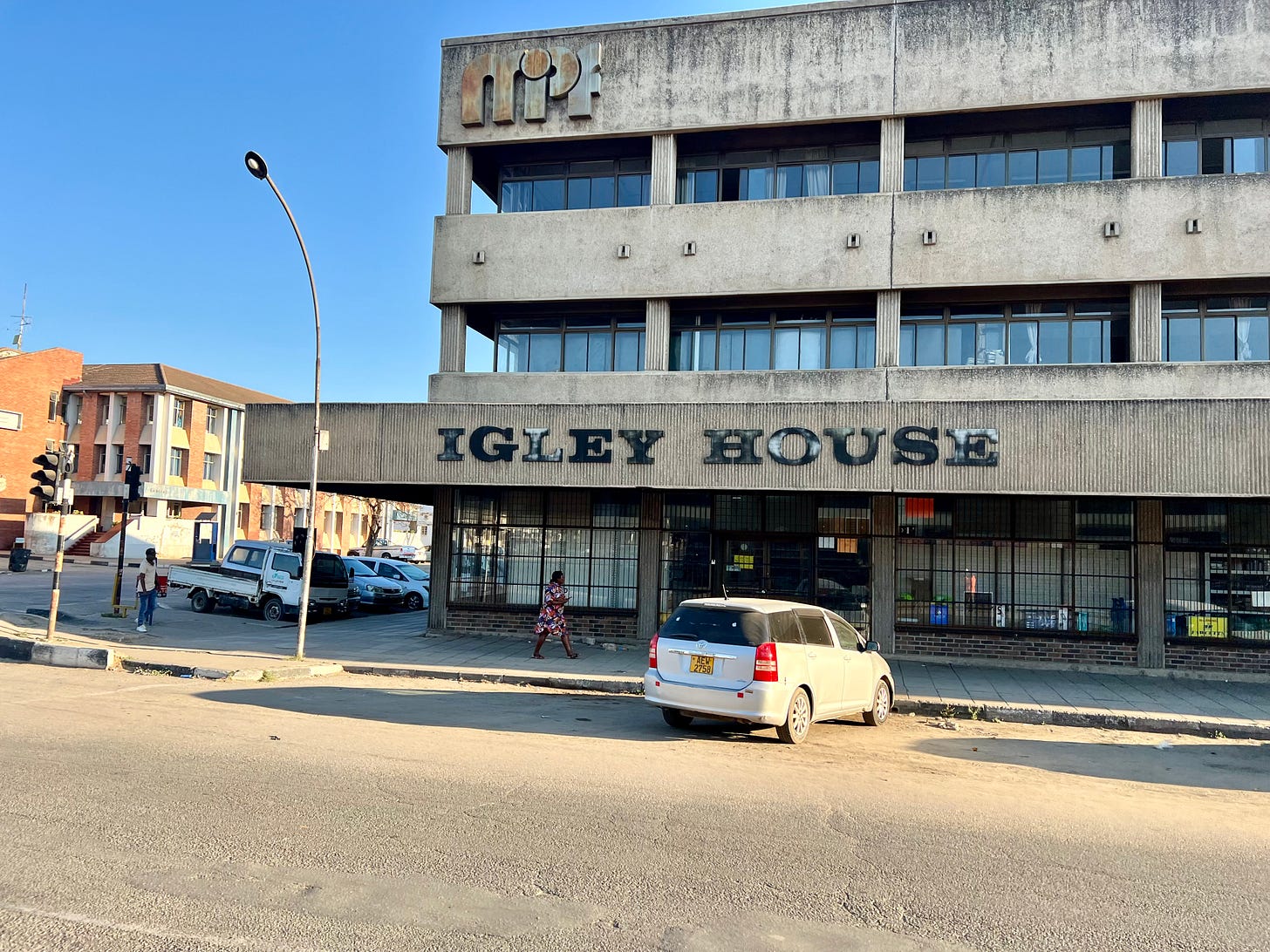
Three further rounds of questioning followed, punctuated by long stints back in the cell. The questions were sporadic and covered an absurdly broad spectrum—from the price of a gigabyte of mobile data in the UK, to whether or not James was a member of the Anglican church. My answers were filled out in duplicate, then triplicate by the growing number of scribes in attendance; scribes that had, no doubt, caught the scent of bribes in the water. I was asked to recount my last year of travel, including entry and exit dates from each country—a mammoth task that took nearly as long as the journey itself. The information, like all the rest, was carefully noted down on yet another blank sheet of paper, and placed atop the growing pile. The interrogation was becoming a circus.
By the fourth round of questioning, my patience snapped and my temper flared. Lifeless lump no more, I demanded my phone so I could just show them the fucking picture and end this senselsss pantomime. I was swiftly ejected and told to go and calm down. Back in my cell, an officer arrived to fill out my criminal profile. I was stripped down to my underwear so that my distinguishing marks could be catalogued. My Carpe Diem tattoo—an act of reckless rebellion at 15—was noted down. Siezed today! I thought and let out a maniacal snort, prompting a quizzical look from my deadpan companion. I had clearly not calmed down.
Eventually, I was admitted back into the office. The captain had made the decision—all on his own—that my phone should be returned and the picture in question examined. Once unlocked, it was promptly snatched back from my hands and the officers crowded round to pore over the visual history of my trip. They sifted gleefully through a year-long backlog of personal photos, snickering among themselves as they did. Occasionally, the laughter would subside, abruptly replaced by intense severity, and a particular image would be scrutinised. From the pictures, they moved onto my messages—group chats with my family, the conversation history with my girlfriend. It was textbook humiliation. Anger burned behind my eyes but I bit my tongue, determined not to give them another excuse for dismissal, or the satisfaction of a reaction.
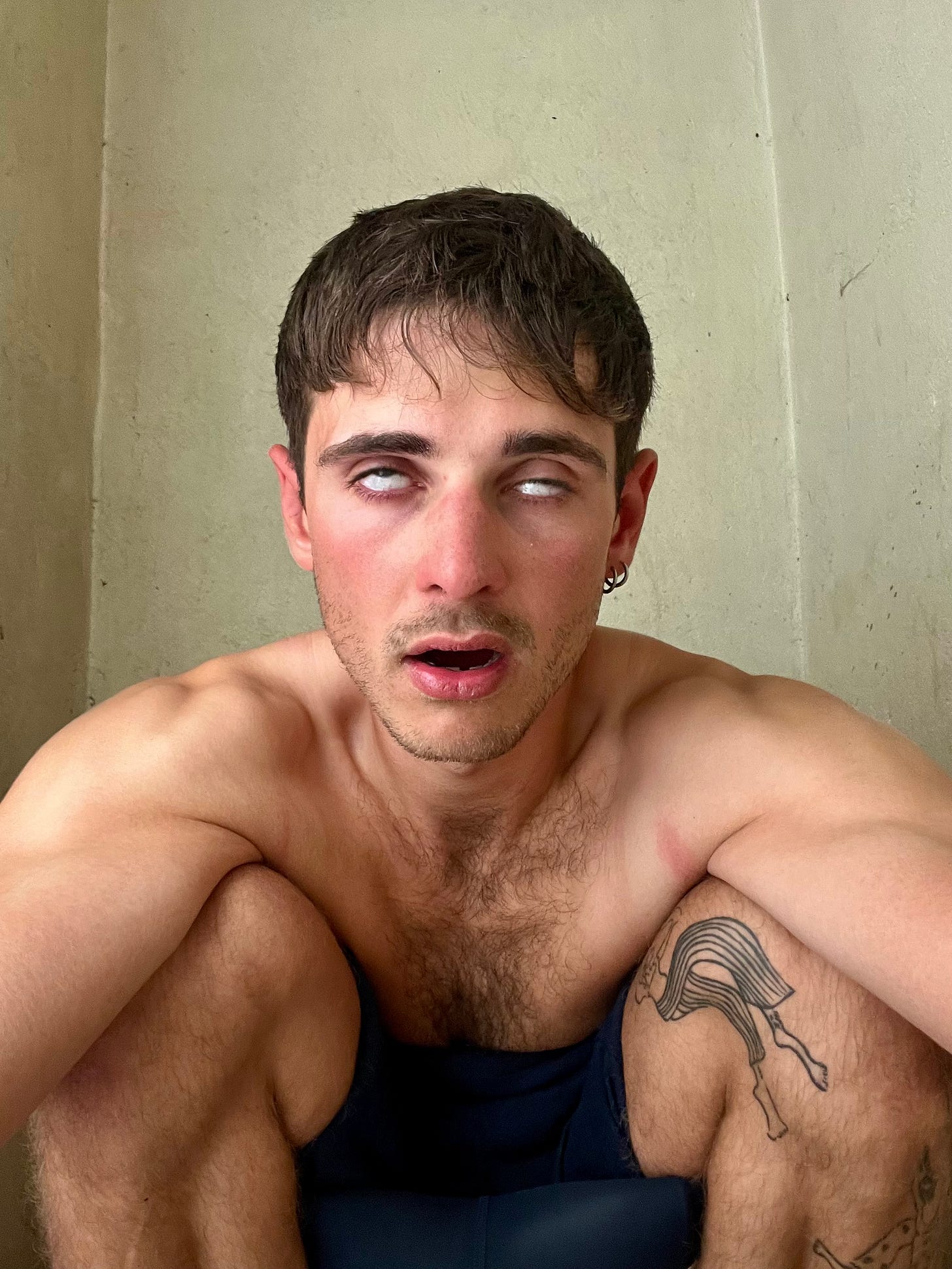
And then it was all over. I was called from my cell for the final time, my phone and passport returned. Without another word from the officers, the door to the reception was opened and I was released. James was there, along with his brother and son. They’d been waiting patiently for four hours, fighting my case with the officers between interrogations, even offering themselves up for questioning in the hope of aiding the process. Apparently, James’ wife had also volunteered to join them, but it was decided that, once the ordeal was over, the lump may be in need of a good hot meal. I was floored. To experience such unconditional generosity from a virtual stranger is intensely humbling. It makes you question why you deserve such kindness, and whether, if the roles were reversed, you’d have the character to do the same.
The five of us—James, his crew, Madonna and me—bundled into the family pickup and headed for home. A feast awaited. We sat in the lounge—laden trays, lovingly prepared by the home team, balanced on our knees—and ate, and laughed, and philosophised, long into the night. Occasionally, James would refer reverently to the evening’s events—which he’d christened the incident—before swatting it from the air and encouraging me to forget all about it. In such supportive company, this was an easy assignment. Once we’d put the world to rights, a bucket of warm water was prepared and I finally stripped off my clammy Lycra and bathed.
Before bed, I called my parents and relayed the evening’s events. I was particularly keen to clarify the story to my mother—a closet dot-watcher—after realising that my phone’s location had been gaily broadcasting for the last four hours from Masvingo’s police station. Thankfully, the detail of the map hadn’t been granular enough to reveal the particularities of my environnement, and it turned out she’d simply assumed the dot had reached James’ house. She’d have no doubt been happily reflecting on the power of hands united, blissfully unaware that her son was at that very moment experiencing power of a different kind—the kind that exists when people are divided into those that hold all the cards and those that have nothing to play with.




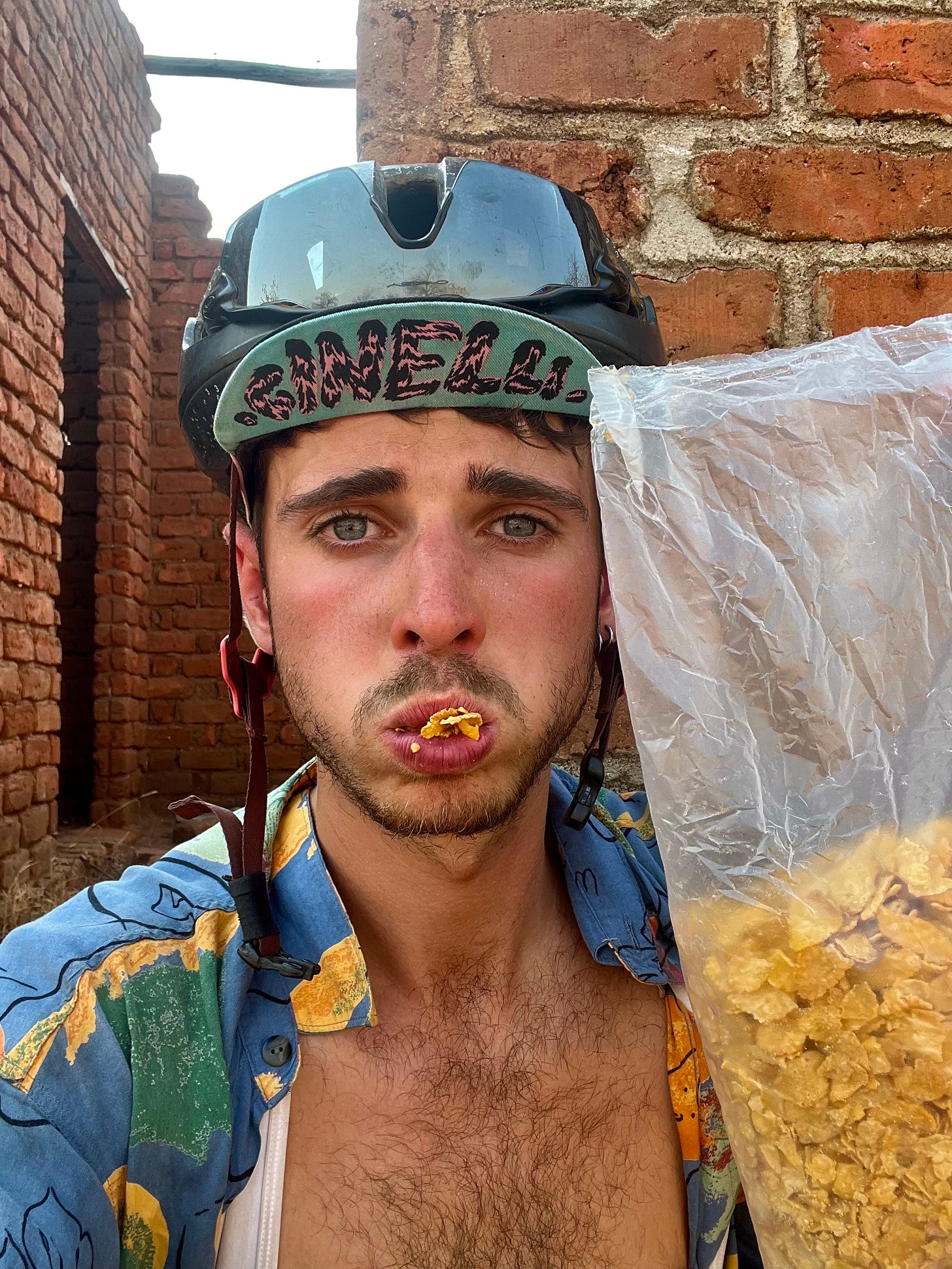
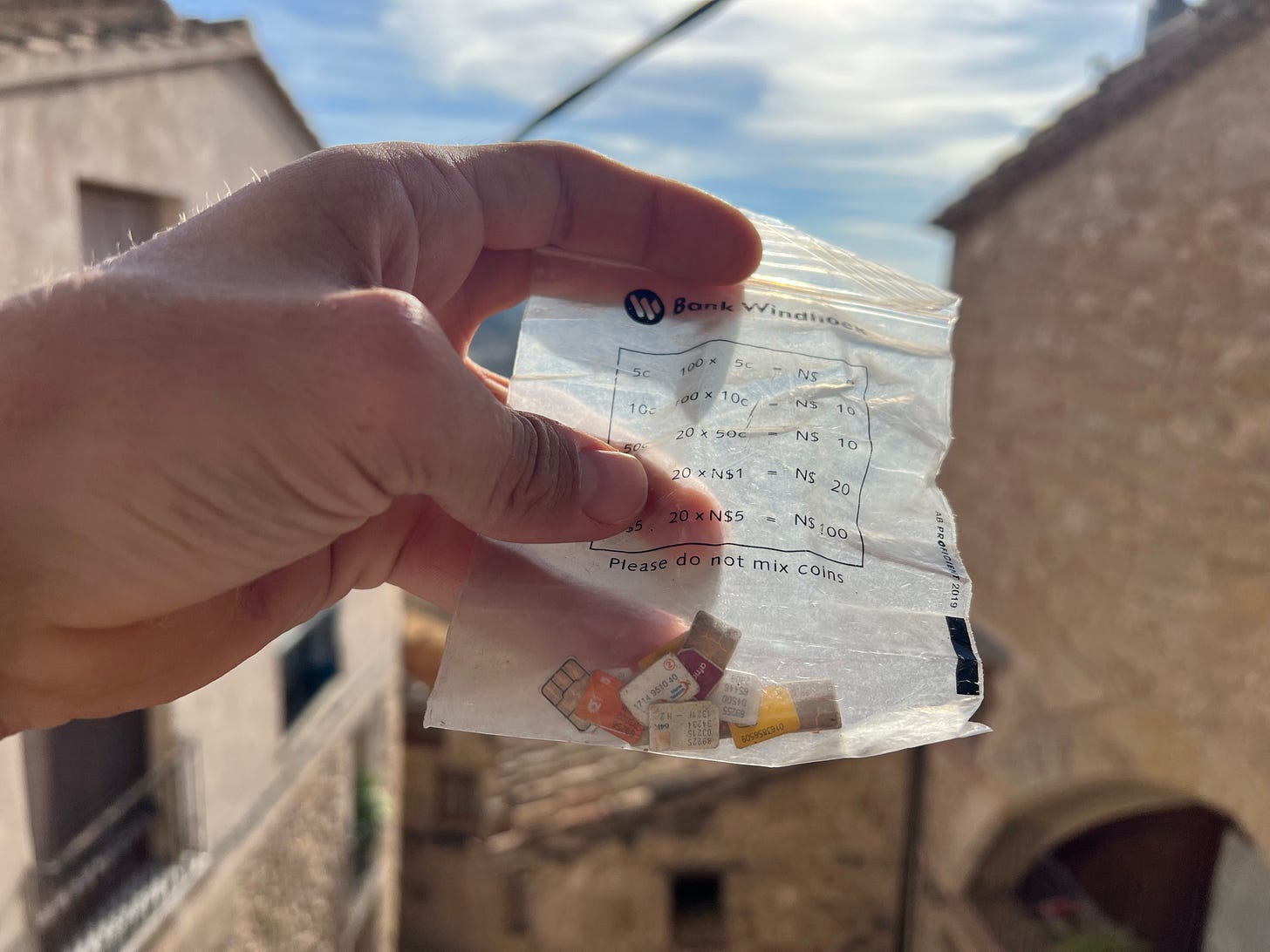

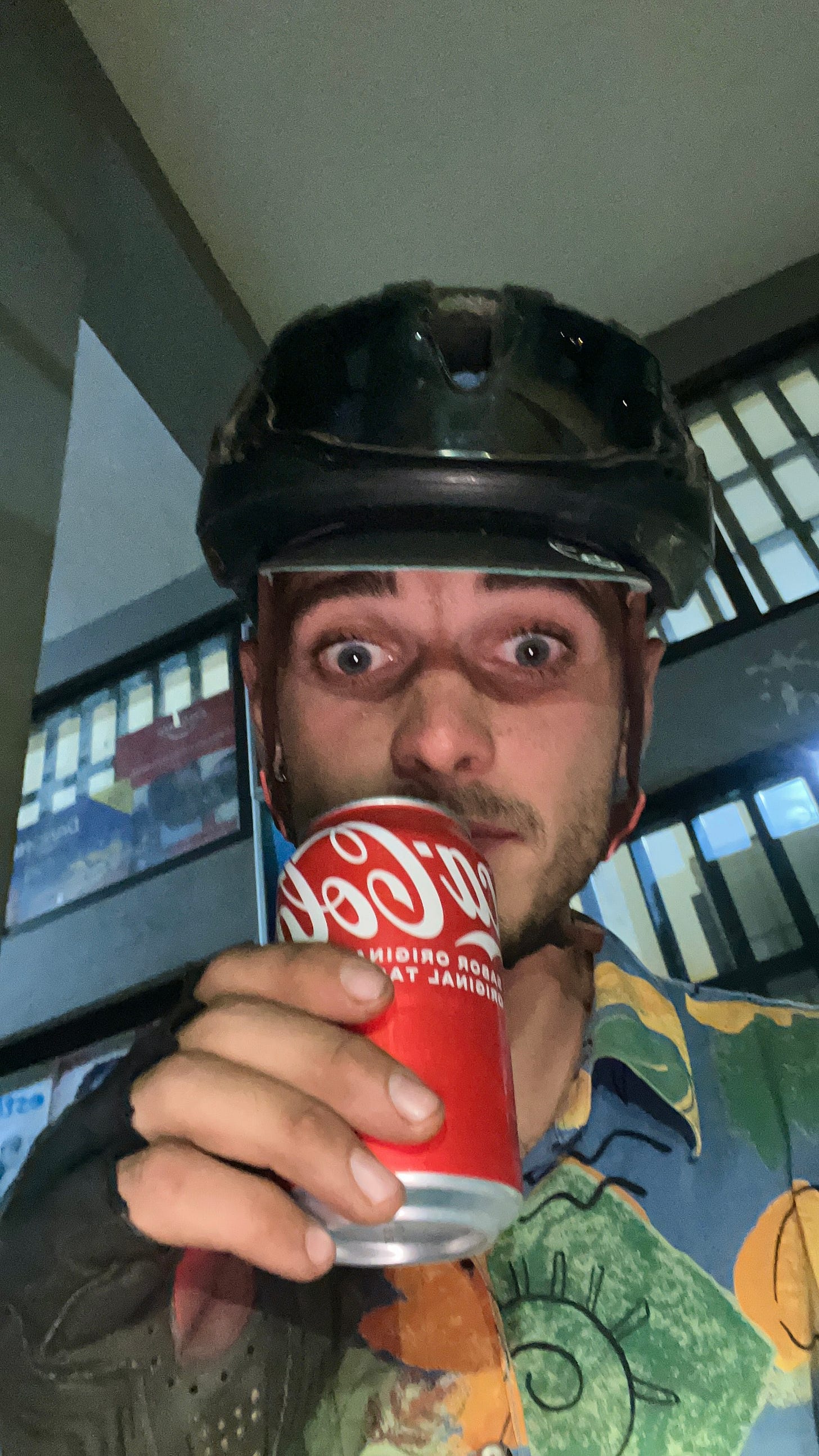


Jake!
I just stumbled upon this blog. I can’t believe I got you arrested. ;) And more miraculously, I can’t believe we met each other in Rwanda! Craziest ‘small world’ story I’ve been involved in.
Well, having heard your account first-hand, while sitting with you in our home in the Soutpanaberg Mountains, Limpopo, and being shocked by the whole business then, reading the details got me so angry all over again on your behalf. Particularly the goons reading your messages...... how shameful!! And those arrogant idiots bear no resemblance to the average open, friendly,helpful and lovely Zimbabweans that we know. But what a great rendition of the event Jake!!! And James - what a superb human being!!!